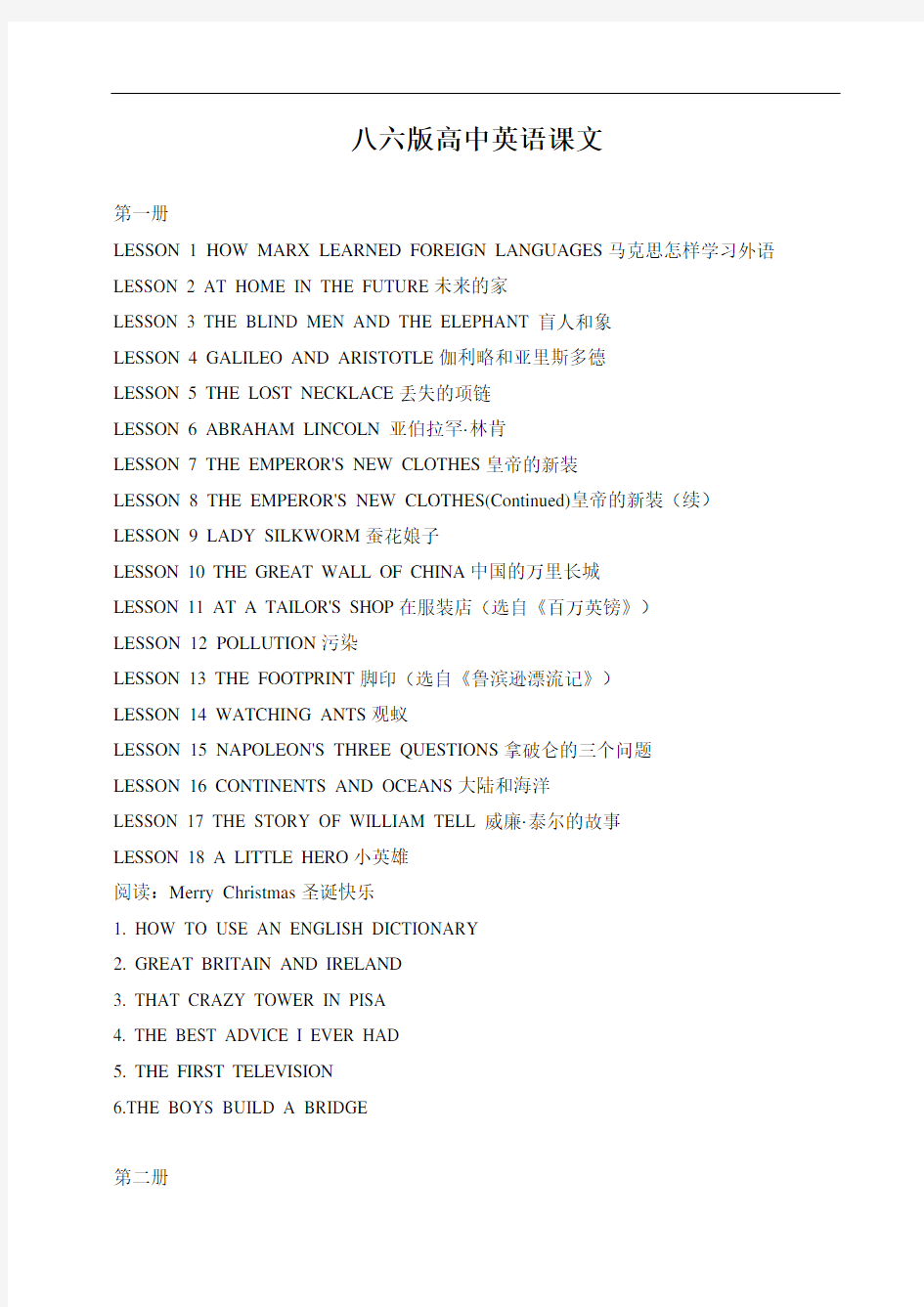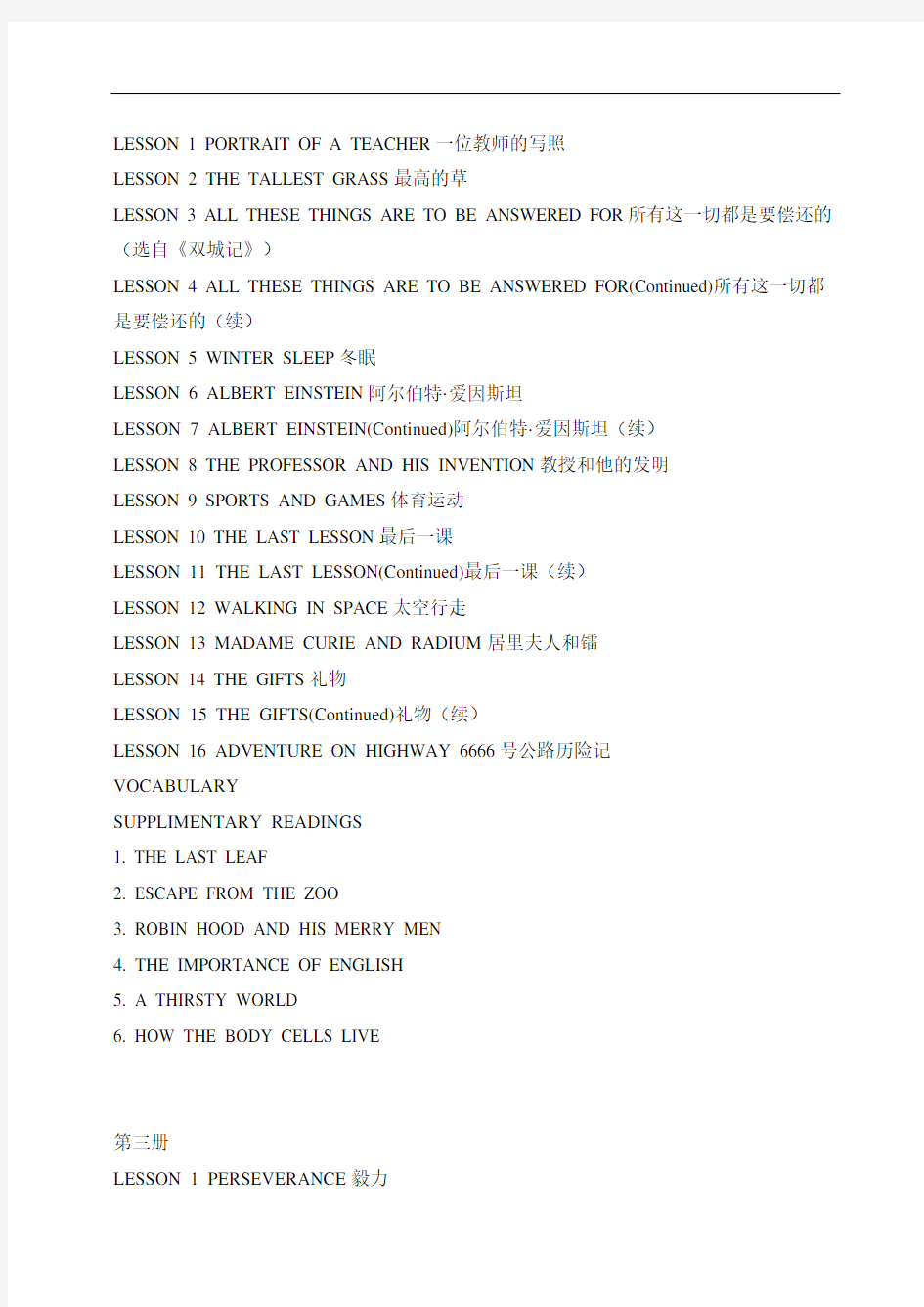

八六版高中英语课文
第一册
LESSON 1 HOW MARX LEARNED FOREIGN LANGUAGES马克思怎样学习外语LESSON 2 AT HOME IN THE FUTURE未来的家
LESSON 3 THE BLIND MEN AND THE ELEPHANT 盲人和象
LESSON 4 GALILEO AND ARISTOTLE伽利略和亚里斯多德
LESSON 5 THE LOST NECKLACE丢失的项链
LESSON 6 ABRAHAM LINCOLN 亚伯拉罕·林肯
LESSON 7 THE EMPEROR'S NEW CLOTHES皇帝的新装
LESSON 8 THE EMPEROR'S NEW CLOTHES(Continued)皇帝的新装(续)LESSON 9 LADY SILKWORM蚕花娘子
LESSON 10 THE GREAT WALL OF CHINA中国的万里长城
LESSON 11 AT A TAILOR'S SHOP在服装店(选自《百万英镑》)
LESSON 12 POLLUTION污染
LESSON 13 THE FOOTPRINT脚印(选自《鲁滨逊漂流记》)
LESSON 14 WATCHING ANTS观蚁
LESSON 15 NAPOLEON'S THREE QUESTIONS拿破仑的三个问题
LESSON 16 CONTINENTS AND OCEANS大陆和海洋
LESSON 17 THE STORY OF WILLIAM TELL 威廉·泰尔的故事
LESSON 18 A LITTLE HERO小英雄
阅读:Merry Christmas圣诞快乐
1. HOW TO USE AN ENGLISH DICTIONARY
2. GREAT BRITAIN AND IRELAND
3. THAT CRAZY TOWER IN PISA
4. THE BEST ADVICE I EVER HAD
5. THE FIRST TELEVISION
6.THE BOYS BUILD A BRIDGE
第二册
LESSON 1 PORTRAIT OF A TEACHER一位教师的写照
LESSON 2 THE TALLEST GRASS最高的草
LESSON 3 ALL THESE THINGS ARE TO BE ANSWERED FOR所有这一切都是要偿还的(选自《双城记》)
LESSON 4 ALL THESE THINGS ARE TO BE ANSWERED FOR(Continued)所有这一切都是要偿还的(续)
LESSON 5 WINTER SLEEP冬眠
LESSON 6 ALBERT EINSTEIN阿尔伯特·爱因斯坦
LESSON 7 ALBERT EINSTEIN(Continued)阿尔伯特·爱因斯坦(续)
LESSON 8 THE PROFESSOR AND HIS INVENTION教授和他的发明
LESSON 9 SPORTS AND GAMES体育运动
LESSON 10 THE LAST LESSON最后一课
LESSON 11 THE LAST LESSON(Continued)最后一课(续)
LESSON 12 WALKING IN SPACE太空行走
LESSON 13 MADAME CURIE AND RADIUM居里夫人和镭
LESSON 14 THE GIFTS礼物
LESSON 15 THE GIFTS(Continued)礼物(续)
LESSON 16 ADVENTURE ON HIGHWAY 6666号公路历险记
VOCABULARY
SUPPLIMENTARY READINGS
1. THE LAST LEAF
2. ESCAPE FROM THE ZOO
3. ROBIN HOOD AND HIS MERRY MEN
4. THE IMPORTANCE OF ENGLISH
5. A THIRSTY WORLD
6. HOW THE BODY CELLS LIVE
第三册
LESSON 1 PERSEVERANCE毅力
LESSON 2 A GERMAN STAMP一张德国邮票
LESSON 3 ON READING谈读书
LESSON 4 THREE GOLD MEDALS FOR WILMA威尔玛的三枚金牌LESSON 5 THE SNAKE IN THE SLEEPING BAG睡袋里的蛇LESSON 6 MY TEACHER我的老师(选自海伦·凯勒《我的一生》)LESSON 7 THE TRIAL审判(选自《威尼斯商人》)
LESSON 8 CHARLES DARWIN查尔斯·达尔文
LESSON 9 THE LANGUAGE OF THE BEES蜜蜂的语言
LESSON 10 THE SIXTH DIAMOND 第六颗钻石
LESSON 11 A SPEECH BY NORMAN BETHUNE诺尔曼·白求恩的演讲LESSON 12 FROM THE JAWS OF DEATH绝处逢生
VOCABULARY
SUPPLIMENTARY READINGS
1. FACE TO FACE WITH DANGER
2. PAPER AND ITS USES
3. STICK-UP
4. THE EARTHWORM
5. A GIFT FOR MOTHER'S DAY
6. MYSTERIES OF MIGRATION
7. SING FOR ME
8. THE DOG THAT SET ME FREE
9. TWO POEMS
1、HOW MARX LEARNED FOREIGN LANGUAGES
Karl Marx was born in Germany, and German was his native language. When he was still a young man, he was forced to leave his homeland for political reasons. He stayed in Belgium for a few years; then he went to France. Before long he had to move on again. In 1849, he went to England and made London the base for his revolutionary work.
Marx had learned some French and English at school. When he got to England, he found that his English was too limited. He started working hard to improve it. He made such rapid progress that before long he began to write articles in English for an American newspaper. In fact, his English in one of these articles was so good that Engels wrote him a letter and praised him for it. Marx wrote back to say that Engels' praise had greatly encouraged him. However, he went on to explain that he was not too sure about two things--the grammar and some of the idioms.
These letters were written in 1853. In the years that followed, Marx kept on studying English and using it. When he wrote one of his great works, The Civil War in France, he had mastered the language so well that he was bale to write the book in English.
In the 1870's, when Marx was already in his fifties, he found it important to study the situation in Russia, so he began to learn Russian. At the end of six months he had learned enough to read articles and reports in Russian. In one of his books, Marx gave some advice on how to learn a foreign language. He said when a person is learning a foreign language; he must not always be translating everything into his own language. If he does this, it shows he has not mastered it. He must be able to use the foreign language, forgetting all about his own. If he can not do this, he has not really grasped the spirit of the foreign language and can not use it freely.
2、AT HOME IN THE FUTURE
A medical examination without a doctor or nurse in the room? Doing shopping at home? Borrowing books from the library without leaving your home?
These ideas may seem strange to you. But scientists are working hard to turn them into realities.
Let us suppose we can visit a home at the end of this century. We will visit a boy named Charlie Green. He is not feeling well this morning. His mother, Mrs Green, wants the doctor to see him. That is, she wants the doctor to listen to him. She brings a set of wires to Charlie's room. These wires are called sensors. She places one sensor in his mouth and one on his chest. She puts another one around his wrist and one on his forehead. Then she plugs the sensors into a wall outlet. She says the code "TCP". This means "telephone call placed." A little light flashes on the wall. The Green's wireless telephone is ready for a call.
Mrs Green says "2478", the doctor's telephone number. From a speaker on the wall comes the doctor's voice: "Good morning."
"Good morning, Dr Scott," answers Mrs Green. "Charlie isn't feeling too well this morning. I've put the sensors on him. I wonder if you can examine him now."
"Sure," the doctor's voice says. "Well, he doesn't have a fever. And his pulse is fine. Now, breathe deeply, Charlie."
Charlie does so.
"Just a little cold," says the doctor. "Better stay inside today, Charlie. And take it easy."
"Thank you, Doctor," says Mrs Green. "TCC (telephone call completed)." The light on the wall turns off. The phone call and the examination are finished.
"Charlie," says Mrs Green," since you have to stay at home, why don't you do some shopping? You can pick out your new bicycle. After all, your birthday is only two weeks away."
"Great," Charlie answers.
Charlie and his mother sit in front of one of the vision phones. There are several in their house.
"TCP," says Charlie. The word ready appears on the screen of the vision phone.
"New Forest Bicycle Shop," a voice says. "May I help you?"
Charlie answers, "I'd like to see your ten-speed bicycles."
In the next few minutes, pictures of many models of the bicycles are flashed on the screen. The price of each model is also shown.
Then the voice asks, "Are you interested in any of these models?"
"Yes, I'm interested in model 6."
"Do you wish to place an order at this time?"
"Not just yet," answers Mrs Green. "My son's birthday is in two weeks' time. Thank you. TCC."
The vision phone shuts off.
Such would be our home in the future.
2-1、A VISIT TO THE LIBRARY IN THE FUTURE
The shopping is finished. Charlie's parents tell him they have to go out for a little while. "Why don't you visit the library while we're out?" says Charlie's dad. "I know they have some new books on basket-ball, your favourite game."
Charlie goes to one of the visionphones. He places a call to the library. He asks to see one of the new books on basket-ball.
Basket-ball Giant, the name of the book, is flashed on the screen. "Turn," says Charlie. The first page of the book is shown on the screen. Then the second, and the third. Charlie has read about fifty pages of it. Then he hears his mother's voice coming through a speaker on the wall. Charlie turns off the visionphone. He says hello to his mother.
"Where are you?" he adds.
"We're driving on the freeway," Mrs Green says. "This is taking a little more time than we thought. We won't be back until two o'clock. Better get some lunch for yourself."
"What are you doing?" Charlie asks.
"We'll explain later," she says.
"O.K." says Charlie.
3、The Blind Men and the Elephant
Once upon a time there were six blind men who lived in a village in India. Every day
they went to the road nearby and stood there begging. They had often heard of elephants, but they had never seen one, for, being blind, how could they?
One morning an elephant was led down the road where they stood. When they heard that an elephant was passing by, they asked the driver to stop the beast so that they could have a "look".
Of course they could not look at him with their eyes, but they thought they might learn what kind of animal he was by touching and feeling him. For, you see, they trusted their own sense of touch very much.
The first blind man happened to place his hand on the elephant's side. "Well, well," he said. "This beast is exactly like a wall."